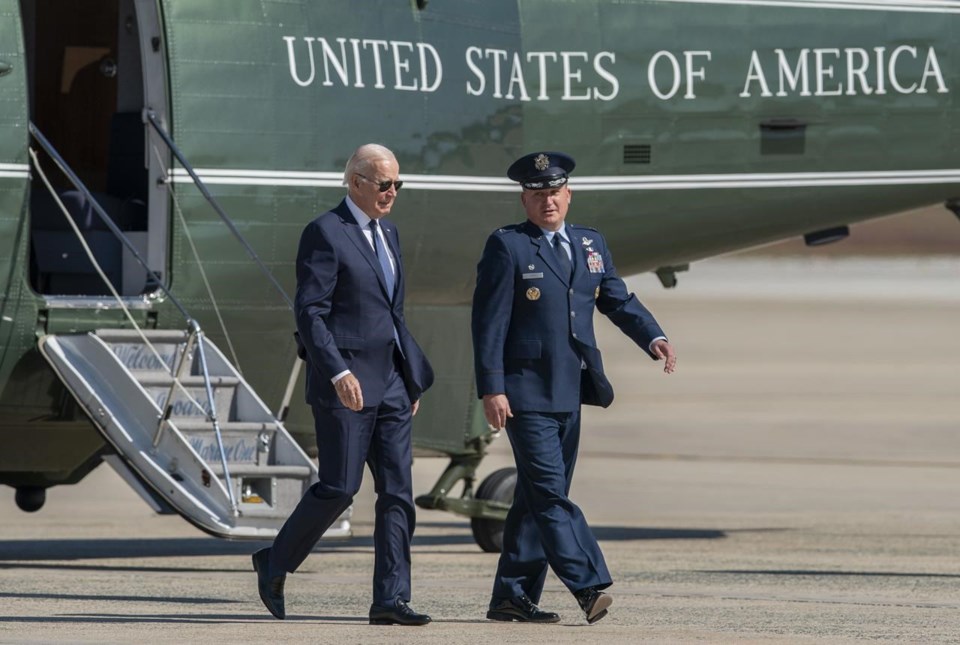WASHINGTON (AP) — President Joe Biden’s warning that the world is was designed to send an unvarnished message that no one should underestimate the extraordinary danger if Russia deploys tactical nuclear weapons in , administration officials said Friday.
The president’s grim assessment, delivered during a Democratic fundraiser on Thursday night, rippled around the globe and appeared to edge beyond the boundaries of current U.S. intelligence assessments. U.S. security officials continue to say they have for a nuclear strike.
Biden veered into talk about Ukraine at the end of his standard fundraising remarks, saying that Putin was “not joking when he talks about the use of tactical nuclear weapons or biological or chemical weapons.”
“We have not faced the prospect of Armageddon since Kennedy and the Cuban Missile Crisis,” he added. He suggested the threat from Putin is real “because his military is — you might say — significantly underperforming.”
White House press secretary Karine Jean-Pierre on Friday did not directly respond to a question about whether Biden had gone into the event intending to invoke Armageddon, as the White House sought to clarify the president's off-the-cuff comments.
She told reporters: “Russia’s talk of using nuclear weapons is irresponsible and there’s no way to use them without unintended consequences. It cannot happen.” She added that "if the Cuban missile crisis has taught us anything, it is the value of reducing nuclear risk and not brandishing it.”
Biden’s national security team for months has warned that Russia could use weapons of mass destruction in Ukraine as it has faced a series of . But the president's remarks were the starkest warnings yet by the U.S. government about the nuclear stakes.
One U.S. official said Biden was also trying to warn against underestimating the danger any level of tactical nuclear weapons.
There’s some concern in the administration that Russia has determined it can use its nuclear arsenal in a manner short of a “full-blown” nuclear attack on Ukraine and face only limited reaction from U.S. and Western allies who are determined to keep the Ukraine conflict from turning into a broader war, according to the official, who spoke on condition of anonymity to discuss administration thinking
Putin has repeatedly alluded to using his country’s vast nuclear arsenal, including last month when he announced plans to conscript Russian men to serve in Ukraine.
“I want to remind you that our country also has various means of destruction ... and when the territorial integrity of our country is threatened, to protect Russia and our people, we will certainly use all the means at our disposal,” Putin said. “It’s not a bluff.”
In Europe, leaders sought to turn down the volume after Biden’s stark warning.
Asked about Biden’s remarks, French President Emmanuel Macron said it was crucial to speak with care on the nuclear threat.
“I have always refused to engage in political fiction, and especially ... when speaking of nuclear weapons,” Macron said at a EU summit in Prague. “On this issue, we must be very careful.”
European Council President Charles Michel told reporters that leaders take “every escalation very seriously,”
“Threats will not intimidate us,” Michel said. “Instead, we are going to remain calm. We are going to keep cool heads and we will, each time, denounce the irresponsible character of these threats.”
Jean-Pierre reiterated on Friday the U.S. has “not seen any reason to adjust our own strategic nuclear posture nor do we have indications that Russia is preparing to imminently use nuclear weapons.”
It’s not the first time that Biden’s comments have appeared to .
Last month, Biden, in a CBS “60 Minutes” interview, said that “U.S. forces, U.S. men and women, ”
The White House said after the interview that U.S. policy toward Taiwan hasn’t changed. That policy says Washington wants to see Taiwan’s status resolved peacefully but doesn’t say whether U.S. forces might be sent in response to a Chinese attack.
In March, as he wrapped up a speech in Warsaw, Biden seemed to call for the ouster of Putin, saying, “For God’s sake, this man cannot remain in power.” Before Biden could even board Air Force One to begin the flight back to Washington, aides were scrambling to clarify that he wasn’t calling for an immediate change in government in Moscow.
Earlier that month, Biden called Putin a “war criminal” for the Russian onslaught in Ukraine before the White House walked back the comments. The White House had been avoiding applying the “war criminal” label to Putin, because it requires investigation and an international determination.
After Biden used the term, his then-press secretary, Jen Psaki, said the president was “speaking from his heart” and clarified that the administration acknowledged there is a process for making a formal determination.
As for Biden's latest eyebrow-raising remarks, “People sort of say, ‘Oh, yeah, it’s Biden. You know, he says this stuff,’” said Hans Kristensen, director of the Nuclear Information Project at the Federation of American Scientists, and a veteran of nuclear policy research.
“But overseas countries are saying, ‘Whoa, this is what the U.S. president says,”’ Kristensen said. “And so that means we have to be really careful about using big words” that in themselves can escalate nuclear tensions unintentionally.
Biden’s strong choice of words could have an have an unintended impact with Russia, Kristensen said, the biggest problem with the president’s latest comments.
“It’s quite clear to me that Putin will be looking at this and say to himself ’Wow, you know, I got their attention now. So they’re really afraid.'”
___
Associated Press writers Sylvie Corbet in Prague, Lorne Cook in Brussels and Zeke Miller in Washington contributed reporting. Boak reported from Hagerstown, Maryland.
___
Follow AP’s coverage of the war in Ukraine at https://apnews.com/hub/russia-ukraine
Aamer Madhani, Ellen Knickmeyer And Josh Boak, The Associated Press




